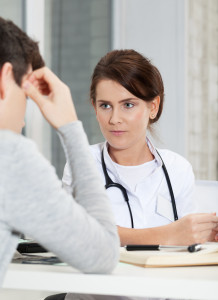- Calls to this hotline are currently being directed to Within Health or Eating Disorder Solutions
- Representatives are standing by 24/7 to help answer your questions
- All calls are confidential and HIPAA compliant
- There is no obligation or cost to call
- Eating Disorder Hope does not receive any commissions or fees dependent upon which provider you select
- Additional treatment providers are located on our directory or samhsa.gov
Malnourishment and Poor Body Image
Contributor: Crystal Karges, MS, RDN, IBCLC, Special Projects Coordinator at Eating Disorder Hope/Addiction Hope

Many factors contribute to a person’s body image, including environmental circumstances, social issues, biological makeup and genetic predisposition. Negative body image may occur with severe mental illnesses, such as an eating disorder or mood disorder, such as depression or severe anxiety.
When Body Image Becomes More than Negative Self Talk
Eating disorders, such as anorexia nervosa, bulimia nervosa, or binge eating disorder, can influence poor body image. Severe body image distortions that result from an eating disorder involve a complexity of issues and do require professional intervention for treatment and healing.
In come cases, poor body image can progress into a more serious disorder. For example, a person who is constantly dissatisfied with how they look or who feels uncomfortable in their own body may attempt to manipulate their appearance through their food intake.
This may include severe restriction, dieting measures, extreme exercise, and more. For a person who is biologically predisposed to having an eating disorder, poor body image and dieting can develop into an eating disorder.
Eating Disorders Are Complex

Perhaps one of the most dangerous aspects about eating disorders is the perpetual and vicious cycle that behaviors are engaged in. A person with anorexia for example, will likely continue to severely restrict caloric intake, regardless of the physical or emotional consequences that may be unfolding. This is similarly observed in other eating disorders, and unless there is professional intervention, behaviors can be ongoing and continuous.
The side effects of an eating disorder can in fact worsen preexisting body image difficulties or induce negative body image. There are many factors that may influence this, one being malnourishment and physical starvation. What exactly is the connection here?
The Relationship Between Eating Disorders and Malnutrition
When a person severely restricts their intake or has inconsistencies in how they eat, they may suffer from malnutrition if their diet does not provide them with adequate calories, protein, and nutrients to sufficiently sustain the body.
Malnutrition can also be defined as the insufficient, excessive or imbalanced consumption of nutrients1. There is a common misconception that only a person who is severely underweight is at risk of malnutrition. However, this is not the case, and malnutrition can result irrespective of weight. An individual who struggles with anorexia, bulimia, or binge eating disorder may develop malnutrition as a result of erratic and irregular eating behaviors.
The Side-Effects of Malnutrition

Malnutrition can in fact exacerbate poor body image as the regions of the brain that are involved with judgment and cognition are directly impacted. In this scenario, there is a direct biological connection to negative body image, one that is created by a lack of proper and adequate nutrition to the brain.
Individuals Suffering with Malnutrition
Because eating disorders and negative body image are the result of many factors, treatment must be involved and holistic in nature. Addressing the many concerns associated with poor body image and eating disorders requires the assistance of many health professionals and specialists.
In the case that an individual is suffering with malnutrition, this should be addressed as a priority in treatment. With proper and adequate feeding and nourishment of the body, a person will be more able to think rationally and more clearly view themselves and their bodies.
Community Discussion – Share your thoughts here!
What are your thoughts on the connection between malnutrition and poor body image? Have you struggled with an eating disorder and poor body image? How did you treatment and recovery help improve the overall way in which you perceive yourself and your body?
References:
- Medical News Daily. “What is Malnutrition? What Causes Malnutrition?” http://www.medicalnewstoday.com/articles/179316.php Accessed 23 June 2015.
Last Updated & Reviewed By: Jacquelyn Ekern, MS, LPC on July 7th, 2015
Published on EatingDisorderHope.com
